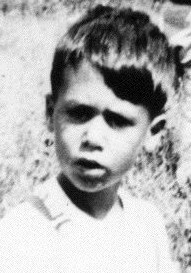We visited my grandfather once a week. During the baseball season, he would be watching a game on TV in the living room. The TV turned off, the grownups moved to the kitchen to talk. I studied the pattern of the oriental carpet on the floor. I flipped through the pages of an illustrated dictionary on the small table in the hall. I was bored.
My father took me to a few games at Ebbets Field, and when I became a turncoat, Yankee Stadium. I remember both places. I remember being able to see, from inside, bits of the city beyond the walls, and not being able to see, from outside, anything of any interest inside. I remember seeing Duke Snider, Roy Campanella, Yogi Berra, all the others.
What I don’t remember is how important it was to me. Jackie and Allen
were important, but they weren’t
true friends. Later our friendship seemed more like a transaction. I contracted to become a Yankee fan, and they agreed to supply me with a surrogate family less problematic than my real one—plus free baseball cards.
When summers ended, I returned to school, which at first was an elementary school across the street from the Dyker Beach Golf Course, one of the few public ones in the city. Walking home one afternoon, fog from the bay was so thick I was afraid I’d get lost. I was supposedly the smartest kid in my graduating class, so I got a pen and pencil set embossed with my name—misspelled, of course. It was the last time I would do well in school.
The last empty lot sprouted more nearly identical houses. I went to Edward B. Shallow Junior High School, which meant a bus commute back to my old neighborhood. There I could skip a grade. Allen didn’t do well enough to skip a grade, so he went to a different school. Jackie, intending to become an engineer like his father, passed the exam and went to Brooklyn Tech.
The three of us had joined the Boy Scouts. Our troop met in the basement of a Lutheran church on 85th Street. It was a small troop. Once we went to Staten Island to camp overnight. When we got off the ferry one of the boys fell and got a deep cut in his hand. No one else seemed to know what to do so I took charge, first leading the injured boy to a barber shop, where we borrowed a towel to stanch the blood, then finding a doctor who would stitch up the wound. I was proud of having acted with such competence and authority, which seemed so uncharacteristic to everyone, myself included.
Inevitably, I was the troop scribe. I had a thin composition notebook, but I don’t remember what I was expected to write in it. Once, though, I wrote a parody of Hemingway, even though I had probably only read other parodies of Hemingway. I also wrote one or two stories—and my first poem—which I showed to a teacher.
In the fall of 1955, during the World Series, I was on a bus coming home from school. The 18th Avenue sidewalks were crowded with people not going anywhere, just screaming and laughing and jumping up and down. The news of the final out caromed around apartments above stores, then shredded into ribbons in the sky, and was ultimately reconstituted in outer space, where Venusians and Martians shrugged whatever Venusians and Martians shrug in lieu of shoulders. Dodgers? What are Dodgers?
A couple of years later, I entered high school, the same one Sandy Koufax went to. At that time he was in the limbo between apprenticeship and greatness. I was in a different limbo—adolescence. Then three desultory, mediocre years before graduation. As a senior, however, I began to make new friends and hang out with the staff of the literary magazine,
Marquis (It was
Lafayette High School). Poetry was a new doom, and I began “wending my maze” (in Peter DeVries’s phrase).
The brothers and I drifted apart. I had other friends. I went to college—CCNY—which involved subway commutes of more than an hour each way, so I was out of the neighborhood a lot. I didn’t improve as a student.
Allen later became an accountant and moved out west. Jackie had gone to Brooklyn Polytechnic University before becoming some sort of engineer. He got engaged to Ruth, a woman who lived across the alley in back of his house. (“She has fat legs,” my mother commented.) He got his own apartment, in a basement a few blocks away. Shortly before he and Ruth were to be married, my mother called me. I was living on Avenue B by then. She said that Jackie had been discovered hanging from a ceiling in his apartment. I remembered him fooling around with nooses in the Boy Scouts.
Alfred and Anne didn’t buy the suicide explanation. They thought it was murder, maybe involving the Mafia. I don’t know if anything came of that theory. The Topps Company relocated to Pennsylvania. Alfred and Anne moved there too.





